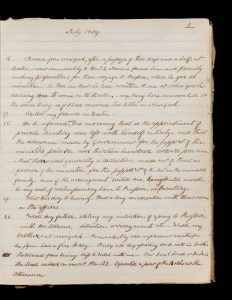By Miriam Liebman, The Adams Papers
Abigail and John Adams became grandparents in 1787 with the birth of their first grandchild, William Steuben Smith, born to their daughter Abigail Adams 2d and her husband, William Stephens Smith. At the time, Abigail and John Adams were deeply engaged in service to the nation with the presidency still to come. Adams Family Correspondence, volume 16, the forthcoming volume in the series, includes the first correspondence between the Adamses and their grandchildren and offers significant insights into their relationship with William Steuben Smith. A previous blog post that focused on Abigail’s relationship with her grandson, John Adams II, can be found here. This post, however, focuses on their relationship with their eldest grandson.
William, who was 17 when the volume opens in late 1804, experienced some growing pains as he neared his twenties. Although many teenagers struggle to figure out their paths in life, some of William’s choices were more ill-advised than others. Growing up in New York City, he visited his grandparents with his mother, Abigail Adams Smith and sister Caroline Amelia, during the fall of 1805, returning to New York that November. A few months later, in January 1806, he became involved in Francisco de Miranda’s failed invasions of Venezuela. While William survived capture and death, his participation had significant consequences for the family. His father’s presumed involvement led Thomas Jefferson to replace William Stephens Smith as the surveyor of the port of New York. His grandson’s actions caused John Adams “great grief” and much concern among other members of the family.
Returning to Quincy and the comfort of his grandparents’ home in September 1807 after the failed mission, William Steuben taught at John Whitney’s school in Quincy. In late March 1808 despite his grandmother’s wishes that he stay longer, he traveled back to his parents in upstate New York. Both of his grandparents worried about his future.
With their many connections to people throughout the country, John wrote to his grandson about different career prospects. Meanwhile Abigail wrote to others about what she thought William Steuben should do next and whether she should write on his behalf for a commission in this army. In a letter to her daughter-in-law Louisa Catherine Adams, she explained her hope that “his engagement with Miranda would be no bar to his employment in the Army.” She continued, “He was under age and was placed with him by those in whom he naturally confided, and knew not Mirandas views.” Clearly having a fond place in his grandmother’s heart, she defended his youthful errors. Abigail described him as having “engageing Manners, and pleasent temper & disposition” and having “a Strict sense of honour and integrity.”
Abigail continued to worry about what her eldest grandson would do. She believed him to be “an amiable modest engageing Youth,” and wrote, “I hope and trust will make his way through the world with honor and integrity.” Given his role in the Miranda Expedition, Abigail blamed William Stephens Smith for ruining his son’s opportunity to be “employd under the present administration.” This only left William Steuben the option of joining his parents in upstate New York to work the land. While Abigail had her doubts that this was right for him, she told his aunt Sarah Smith Adams in early 1808 that, “he appears in good Spirits, pleasent & happy, and assured Me that he did not feel a wish to quit his Situation.”

In July 1809, at the end of this Family Correspondence volume, Smith’s uncle John Quincy Adams prepared to travel to St. Petersburg to serve as the U.S. minister to Russia. William Steuben wrote to him to ask about the opportunity of serving as his uncle’s secretary. After inquiring whether he could choose his own secretary, John Quincy offered his nephew the position. William accepted and remained in Europe until the spring of 1815. He documented his journey to Russia in a diary, held in the Adams Papers at the MHS. This change of fortune and new adventure for William Steuben Smith brought his grandmother “great Gratification.”

